The Asia-Europe Meeting (ASEM)
Prime Minister Shinzo Abe Attends the ASEM 11 Summit Meeting
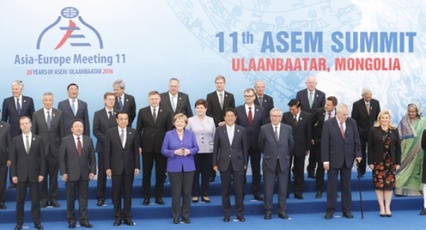 (Pool Photo)
(Pool Photo)
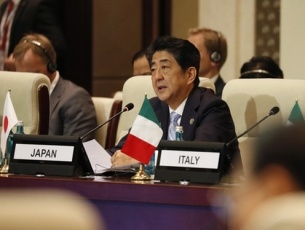 (Pool Photo)
(Pool Photo)
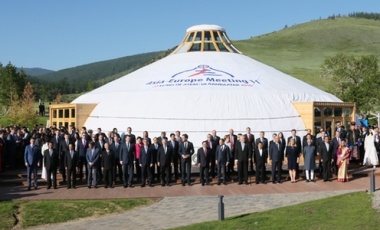 (Photo: Cabinet Public Relations Office)
(Photo: Cabinet Public Relations Office)
Mr. Shinzo Abe, Prime Minister of Japan, attended the 11th Asia-Europe Meeting (ASEM 11) Summit Meeting, which was held in Ulaanbaatar, Mongolia on Friday, July 15 and Saturday, July 16. The representatives of 51 countries and two organizations attended the meeting. The overview is as follows.
1. Overview
(1) Plenary Session One: “Two Decades of Partnership: Taking Stock and Looking Ahead” (July 15)
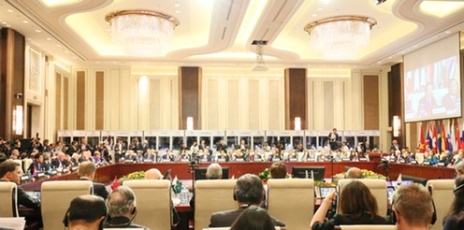 (Photo: Cabinet Public Relations Office)
(Photo: Cabinet Public Relations Office)
 (Photo: Cabinet Public Relations Office)
(Photo: Cabinet Public Relations Office)
Prime Minister Abe made remarks at Session One as the lead speaker. At the beginning, he offered his condolences over the terrorist attack in Nice as well as resolutely condemned the terrorist attack in Bangladesh that claimed the lives of Japanese nationals, and emphasized that Asia and Europe should jointly issue a clear message on confronting terrorism. In addition, with regard to the global economy facing uncertain circumstances, Prime Minister Abe referred to a response to the situation by mobilizing all policy tools, consisting of monetary policy, fiscal policy and structural reform, on the basis of the agreement (PDF) reached at the G7 Ise-shima Summit Meeting in May.
reached at the G7 Ise-shima Summit Meeting in May.
The other leaders of the ASEM members referred to the challenges that the international community faces in areas such as terrorism, refugees, climate change, the United Kingdom’s decision to leave the European Union, and the global economy, and discussed strengthening cooperation and dialogue among the ASEM members, including in relation to economic relations, digital networks, politics, and security.
At the end of the plenary session the President of Mongolia read an independent statement on international terrorism (PDF) statement on international terrorism, and the statement was issued.
statement on international terrorism, and the statement was issued.
(2) Retreat Session: “Enhancing the Three Pillars of ASEM” (July 16)
 (Photo: Cabinet Public Relations Office)
(Photo: Cabinet Public Relations Office)
At the Retreat Session Prime Minister Abe spoke second and discussed Japan’s position on North Korea and the South China Sea, as challenges that are related to regional peace and prosperity.
In addition, the ASEM leaders cited the importance of counterterrorism measures, the rule of law, the rules-based international order and the peaceful resolution of disputes; voiced concerns about maritime security and the South China Sea including the arbitration award between the Philippines and China, as well as North Korea’s nuclear tests and human rights situation; and expressed frank views on issues such as the United Kingdom’s decision to leave the EU, refugees and migrants and the situation in Turkey.
At the end of the Retreat Session a Chair’s Statement (PDF) and the Ulaanbaatar Declaration (PDF)
and the Ulaanbaatar Declaration (PDF) were compiled, and Mr. Donald Tusk, President of the European Council, as the next ASEM Summit Meeting Chair, announced that the EU will hold the next Summit Meeting in the latter half of 2018.
were compiled, and Mr. Donald Tusk, President of the European Council, as the next ASEM Summit Meeting Chair, announced that the EU will hold the next Summit Meeting in the latter half of 2018.
(3) Bilateral meetings: Prime Minister Abe held meetings with the leaders and representatives of participating countries
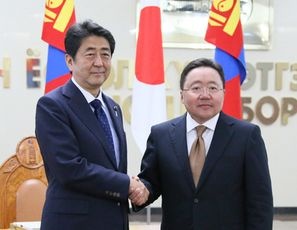 (Photo: Cabinet Public Relations Office)
(Photo: Cabinet Public Relations Office)
While in Ulaanbaatar, Prime Minister Abe held bilateral meetings with the leaders of Mongolia, Germany, Bangladesh, China, the EU, Viet Nam, and Cambodia, and also received a courtesy call from the Secretary of Foreign Affairs of the Philippines, and frank exchanges of views took place.
2. Outcomes
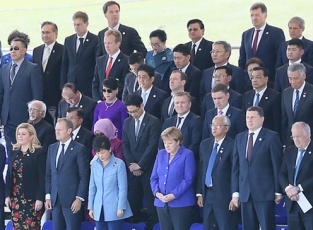 (Photo: Cabinet Public Relations Office)
(Photo: Cabinet Public Relations Office)
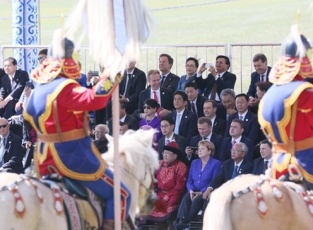 (Photo: Cabinet Public Relations Office)
(Photo: Cabinet Public Relations Office)
Based on the results of Japan’s diplomacy that takes a panoramic perspective of the world map, Prime Minister Abe led exchanges of views among the ASEM leaders on terrorism, the global economy and regional and international affairs. In particular, Prime Minister Abe emphasized that Asia and Europe should cooperate to strengthen the fight against terrorism as an issue facing the international community as a whole in light of the terrorist attack in Nice just prior to the opening of the Summit Meeting, and this led to the issuance of an independent statement on this issue. In addition to various bilateral meetings, Prime Minster Abe met with many leaders and others outside the venue, which served to deepen cooperation with other countries.

